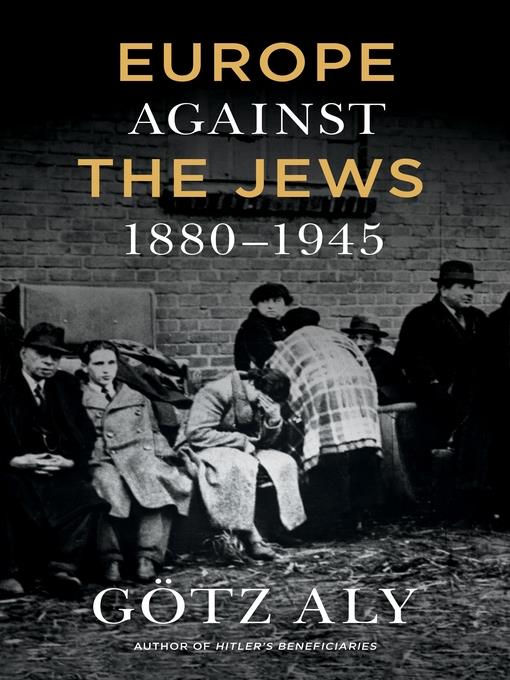
Europe Against the Jews, 1880-1945
کتاب های مرتبط
- اطلاعات
- نقد و بررسی
- دیدگاه کاربران
نقد و بررسی

February 15, 2020
The award-winning German author dips into his vast archive of resources to produce a major work on anti-Semitism. Anti-Semitism has been around for centuries. Though occasionally somewhat dormant, usually during times of fiscal strength and political peace, it always returns to rear its ugly head, each time spelling disaster for Jewish populations. Aly--the highly respected historian of the Holocaust who won the 2007 Jewish Book Award for his excellent Hitler's Beneficiaries--examines the period of 1880 to 1945 to show how, why, and in what forms anti-Semitism increased sufficiently to support the Nazi concept of the Final Solution. The author ranges widely across Europe, examining Russia, Romania, France, and Greece as well as Lithuania, Poland, Ukraine, and other less-explored locales. "There is no way we can comprehend the pace and extent of the Holocaust," writes Aly, "if we restrict our focus to the German centers of command." While Jews were restricted from many jobs, they applied all their strength and determination to areas that were permitted, such as pharmacology, medicine, and journalism. Governmental actions began with bans on Jews serving municipalities and joining trade associations, and they also experienced limited access to education. After World War I, the concept of self-determination morphed into a brand of nationalism and misguided "racial theory" that led to increased animosity and violence. "Insofar as gentiles in the first half of the twentieth century pressed for Jews to be partially or completely stripped of their civil rights or insisted they be shipped off to somewhere outside Europe," writes the author, "they were motivated by [an] obsessive anxiety: the fear of a supposedly overwhelming power and the real intellectual and economic agility of a small, precisely delineable 'foreign' group." Though the gruesome subject and detail are sometimes tough to swallow, readers should forge ahead, relishing the author's incredible research and singular scholarship. Aly delivers again, this time expanding his lens outside of Germany to offer further revelations about the Holocaust.
COPYRIGHT(2020) Kirkus Reviews, ALL RIGHTS RESERVED.

February 17, 2020
In this sweeping and persuasive study, German historian Aly (Why the Germans? Why the Jews?) investigates how and why “the architects of genocide were able to find support for the Final Solution in nearly all of the countries occupied by or allied with Germany.” Noting that the phrase “anti-Semitism” first appeared in 1880, Aly links Russian pogroms, nativist political movements, and unequal distribution of industrial progress to this new form of hostility based on “national, social, and economic arguments.” Though contemporaneous observers claimed that anti-Jewish sentiment arose from envy and “base greed,” the reality, according to Aly, was that restrictive laws curtailed professional opportunities for most Jews. In the wake of WWI, efforts to compel Jewish emigration from Eastern Europe intensified, leading to persecution and violence. While France let in tens of thousands of Jewish refugees in the 1930s, other countries, including the U.S., curtailed entry permits, leaving few safe options for relocation. During WWII, leaders in Croatia and Romania seized the opportunity to rid their countries of Jews. Aly packs this dense account with statistics and analysis, making a convincing case that “the pace and extent” of the genocide could not have been achieved without widespread cooperation. This expertly researched account is destined to influence future histories of the Holocaust.

May 1, 2020
In this latest work, German historian Aly (Why the Germans? Why the Jews?) seeks to explain the successes and failures of Third Reich-directed genocide by tracing the development of late 19th- and early 20th-century anti-Semitism in European nationalist societies and governments. Through it all, Aly never loses sight of the primary and ultimate responsibility of Nazi Germany for the Holocaust. The author supports his contentions that people were motivated by envy and greed, and that desires to advance the educational and economic status of majority populations motivated the governments of Greece, Hungary, Poland, Romania, and others to approve and implement laws that amounted to ethnic cleansing of Jews in the years before World War II. Included are numerous references to works by other historians and sociologists, along with contemporary witnesses. Particularly moving are the testimonies of Holocaust survivors who encountered rejection by their liberated post-war governments and the countrymen who invaded their homes and property, never expecting their return. Aly succeeds in demonstrating how Germany enlisted the populations and governments of occupied countries in their project of mass murder. VERDICT Essential reading for anyone trying to understand the Holocaust with a view toward preventing future genocides. [See Prepub Alert, 10/7/19.]--Joel Neuberg, Santa Rosa Junior Coll. Lib., CA
Copyright 2020 Library Journal, LLC Used with permission.

November 1, 2019
Winner of multiple awards, including the National Jewish Book Award and Germany's prestigious Heinrich Mann Prize, Aly (Why the Germans? Why the Jews?) argues that the Holocaust is not solely Germany's responsibility but was accomplished with the collaboration of all Europe, supported and even facilitated by countries from Romania to France to Greece. He further traces the roots of the Holocaust to resentment starting with increased opportunities for Jews in the late 1800s even as Europe's nation-states became more nationalistic.
Copyright 2019 Library Journal, LLC Used with permission.

























دیدگاه کاربران